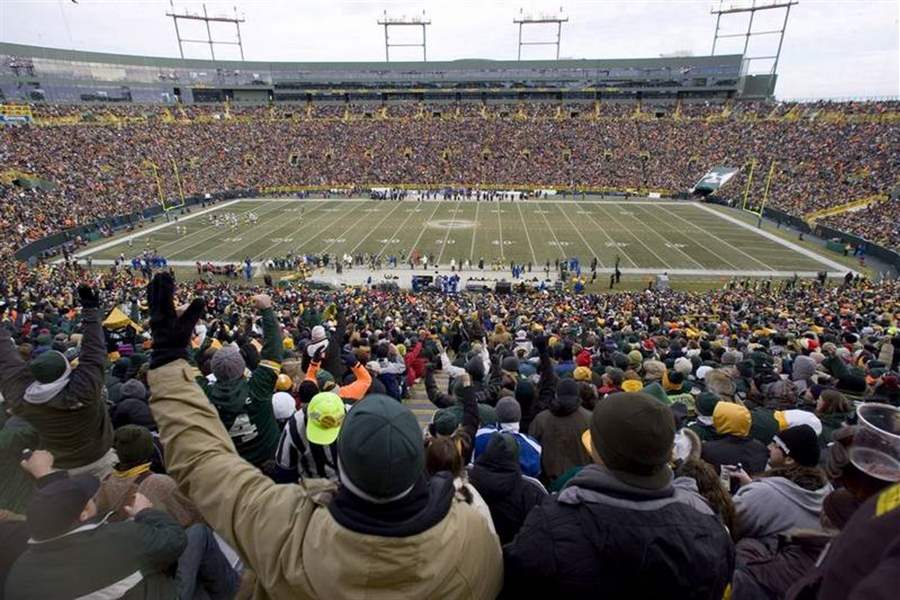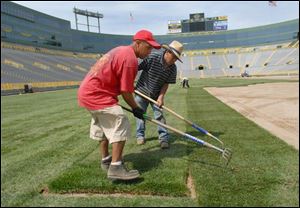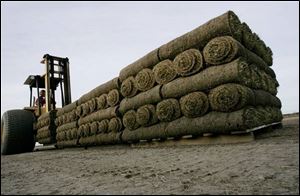
Farm has the dirt on stadium turf
2/4/2008
Green Bay Packer fans celebrate a touchdown at Lambeau Field. Tuckahoe Turf Farms of New Jersey supplies the field's grass.

Green Bay Packer fans celebrate a touchdown at Lambeau Field. Tuckahoe Turf Farms of New Jersey supplies the field's grass.
NEWARK, N.J. - Tuckahoe Turf Farms, a sod grower between Philadelphia and Atlantic City, supplies grass for some of the country's most well-known sports venues, including Lambeau Field in Green Bay and Boston's Fenway Park.
The firm ships its Kentucky bluegrass in refrigerated trucks to football stadiums in Green Bay and Cleveland, and to sports teams closer to home, including the Philadelphia Phillies and the Washington Nationals. It is growing grass now for the New York Mets' new stadium, which opens in 2009.
Business is good for the more than 2,100 U.S. farms that grow sod for homes, parks, and sports fields. There's a steady demand for green landscaping, whether it's for back-yard gardens, youth ballfields, or giant stadiums, said Kirk Hunter, executive director of Turfgrass Producers International.
Nursery, greenhouse, and sod products are now New Jersey's largest agricultural export, with about $390 million in sales in 2006, surpassing fruits and vegetables.

Workers from Tuckahoe Turf Farms install new sod at Lambeau Field in Green Bay, Wis., in May. The sod grower supplies grass to some of the country's most well-known sports venues.
New Jersey's sandy soil is popular for professional sports venues because it drains well, said Stephen Hart, a specialist in turf management and weed science at Rutgers University. "It is one of the most critical issues for an athletic field."
Mr. Hart said clay-based soil from the Midwest doesn't work as well, and grass grown in Southern climates isn't hardy enough to withstand winter in the North.
Professional baseball and football teams started coveting the sand-based technology about 10 to 15 years ago, said Mike Boekholder, head groundskeeper for the Philadelphia Phillies, which uses Tuckahoe sod.
That's when Tuckahoe's business started to grow. The farm now has about 700 acres on land once cultivated for tomatoes, sweet potatoes, and corn. Sales have nearly doubled, to $4 million to $5 million annually.

A worker uses a forklift to move individual pallets of cut, rolled, and stacked Kentucky bluegrass sod from a field at Tuckahoe Turf Farms in Hammonton, N.J.
Its sports business started when Princeton University wanted a sand-based field in the mid-1990s, said James Betts, the grandson of Tuckahoe's founder. Word of mouth spread, and soon the company was supplying grass to the Cleveland Browns.
Green Bay has been using Tuckahoe grass for more than six years. The iconic "frozen tundra" of Lambeau Field has a quarter-inch layer of sod, above a foot of sand to allow for drainage.
"Sand doesn't get as slippery when it's wet. That's why sand is so important. It doesn't make mud when it's wet," said Allen Johnson, Green Bay's field manager.
The sod industry is feeling the impact of the housing market slowdown, but sales to other outlets like sports fields continue to be strong, Mr. Hunter said.
Sales grew by 25 percent to $1 billion from 1997 to 2002, according to the most recent figures from the federal census of agriculture. More than 386,000 acres of sod were grown in 2002, and Mr. Hunter expects a steady increase when the 2007 figures are released.